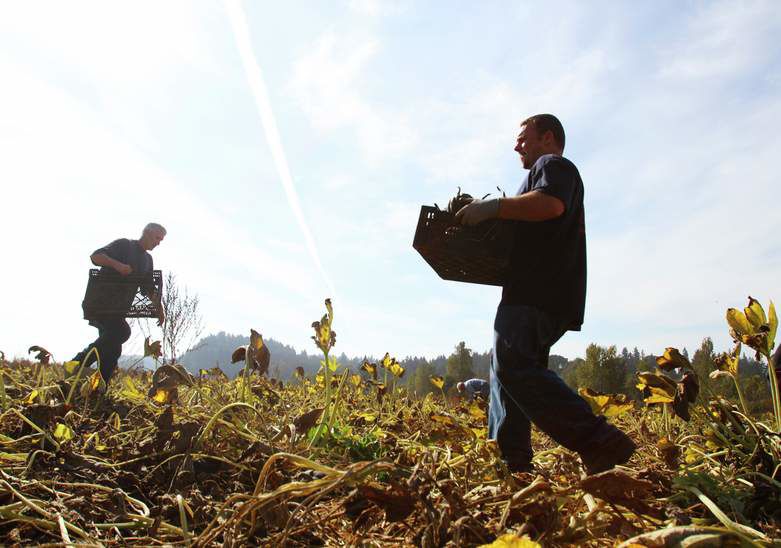Inmates work farm for food banks
Published 5:00 am Sunday, October 7, 2012

- Inmates from Mill Creek Correctional Facility harvest acorn squash recently for the Marion-Polk Food Share in Salem.
SALEM — Marion-Polk Food Share is continuing to build its partnerships with Oregon inmates to help provide food to hungry families — this time, in rural Marion County.
The regional food bank has leased 123 acres of a state-owned farm near the Mill Creek Correctional Facility and began harvesting Sept. 28. It is expecting to get 300,000-400,000 pounds each of acorn squash and butternut squash, hand-picked by a crew of Mill Creek inmates over the next six weeks.
Chief Operating Officer Rick Gaupo said Marion-Polk Food Share will be able to use about 30 percent of the acorn squash to distribute to local pantries. It will share the rest with Oregon Food Bank’s network of 20 regional food banks. The butternut squash will be sold to National Frozen Foods Corp. to help offset the logistics costs.
Marion-Polk Food Share signed a nine-year renewable lease with the Oregon Department of Corrections to use the land at $1 per year. Iverson Family Farms is operating the farm, in exchange for crops produced on 103 acres. Inmates are also providing labor in exchange for 20,000 pounds each of corn and squash to help feed inmates across the state.
The food share also receives produce from gardening programs at state prisons and the Marion County Work Release Center.
Because this is the first year of the agreement, the food share is still learning about farming and the potential impacts this could have on its work. It could be a game-changer.
Starting with the in-house production of protein patties that began early this year, Marion-Polk Food Share began challenging the traditional route that begins with food and monetary donations to the food bank, which supplies the pantries, which then distribute the food in the community.
Leaders at the time were asking, “Can we make our own product?” Gaupo said. The new project extends the question to “Can we grow our product?”
Gaupo said that while food banks will always stay in the food donation business, it continues to add more tools that can mean more food for hungry families.
The local partnership that will have statewide impacts is an example of how strong the Oregon Food Bank network is, said Mike Moran, food resource manager. The network consists of 20 regional food banks across the state and Clark County, Wash.
OFB will pick up squash twice a week for the next six weeks to distribute across the state.
Paul Stanley, a project manager for the corrections department, said the farm land had been left unused since the Legislature years ago shut down the prison farm operation. Still, taxpayer dollars were being used to keep the land mowed and free of insects.
The agreement is freeing up those taxpayer dollars, he said, as well as lowering the cost of feeding inmates. The inmate crews are getting exposure to farming and contributing to the community.
Food share president Ron Hays said that while the farm has great potential, there is a challenge to maximizing the amount of food that can go straight to the food bank. Without the ability to process and preserve the massive amount of food, it won’t be able to use much. Squash was a good option this year because it stays fresh longer than other produce.
“I don’t know what the future holds,” he said.
Moran said Marion-Polk Food Share’s food-growing initiative is an example of how food banks can creatively seek new food sources to keep up with demand. He said while other food banks across the country are exploring farming options, he likes that the Marion-Polk Food Share was able to get the land, farming expertise and labor at a low cost.
“We have to find new resources,” he said. “This is a great way of learning how we can do that. It’d be great if we can replicate it in other counties across the state.”
The deal is also new territory for commercial farmers, which could be seen as a risk.
Farmer Jon Iverson said the family business eased into the project starting with many meetings last winter. In the end, the Iversons supported the food share’s vision.
“We kind of saw, if this works, how much food they’ll be able to supply,” Iverson said. “They get a lot of food and in return we get the acreage we were looking for. It was kind of a great opportunity.”






